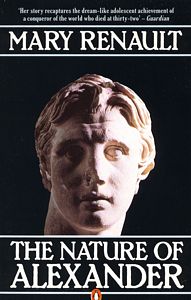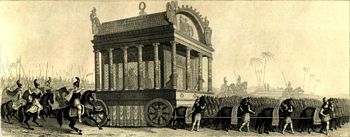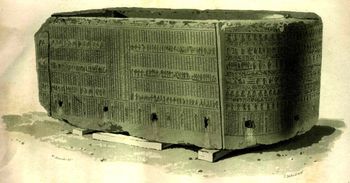nature of Alexander
| série: | Alexandre le Grand |
| éditeur: | Penguin |
| auteur: | Renault Mary |
| classement: | biblio2A |
| année: | 1983 |
| format: | broché |
| état: | TBE |
| valeur: | 10 € |
| critère: | ** |
| remarques: | English book, the nature of Alexander 1/ Images - description of Alexander's funeral carriage with a huge gold shrine, on the way back to Macedonia, Ptolemy takes in Syria the shrine to be put back to Alexander's father Ammon, finally, the shrine was set in Alexandria, Ptolemy was also of the opinion that Alexander's body would be safer in Egypt than in Macedonia - Ptolemy remained the only one of Alexander's successors who died peacefully having managed to firmly establish the Ptolemy's dynasty in Egypt - impact of Aelxander's memory on his post period, fortune had accompanied Alexander, Plutarch described mainly his youth and Flavius Arrianus his conquests - discussion about two English authors of Alexander's life: - George Grote (rather anti-Alexander) and sir William Tarn (rather pro-Alexander) 2/ Macedon - Philip II was asked to assume the throne by his fighting Macedonians (their assembly), during his youth, he was given as a hostage to Thebes (but it was rather for his own security), Philip, from that time on, had always a good admiration for Athens - he met Olympias at Samothrace, Olympia's family claimed descent from Achilles, Philip married her and Alexander was born 356 BC - Alexander was brought up between the hatred of Olympias to Philip and the possessing love of his mother - Philip had made a military revolution, thanks to the richness of Mount Pangaeus' mines of gold and silver, he would set up a formidable army, at the center, the infantry phalanx with the sarissas and a cavalry corpse flanking it, if Philip was the creator, Alexander was to become the virtuoso of this instrument - Alexander grew up with a religious faith to friendship, his first tutor was Leonidas, Olympia's uncle, Lysimachus was his second teacher - it was also during that period that Alexander made the acquaintance of Artabaze, satrap of Artaxerxes Ochus, when he got protection from Philip after a failed rebellion in Persia - Philip became archon of Thessaly and with his increased power, he will be seen as the only one who can unite Greece to fight the Persian empire and liberate the Greek colonies in Asia Minor >> p. 36 description of Philip who had a robust humour that was not passed to Alexander, Philip was the contrary of Demosthenes, an entirely humourless man but a good orator and perhaps patriot, >> see also Demosthenes's meeting with Philip (at an early stage) - at the age of 13, Aristotle became Alexander's tutor, Aristotle was a native of Stagira, he developed Alexander's interests for exploration and discovery as well as for medecine and science, he taught also philosophy and gave to Alexander the self-assurance he needed, with him, Alexander became a man of pride, strength of will and passion, he is also told by Aristotle that man is above woman and therefore man's relationships are vital, meeting with Hephaeston, later Aristotle founded his own university in Athens: the Lyceum >> p. 40 reasons for the selection of Aristotle as tutor of Alexander >> p. 41 the education of Alexander >> p. 44 description of Hephaeston who was much more than a mere bedmate for Alexander - at 16, Alexander became regent of Macedon and proved his ability to reign, he is involved in a quarrel about some sacred fields near Delphi where the Sacred League (a kind of United Nations) voted to punish the Amphissacans which ended in a war against Thebes and Athens which were defeated at Chaeronea in the battle of which the skill and courage of Alexander were to be shown again - Philip is marrying again and during the wedding ceremony, Alexander has his first royal ordeal when disputing with Attalus and with his father, exile to Epirus >> p. 59 strange behaviour of Alexander however in the case of Arrhidaeus, destined by Philip to be married to the daughter of Pixodarus, satrap of Caria, it shows that Alexander's emotional senses were rather to break than to bend - Pausanius, captain of Philip's bodyguards, murdered Philip and to Alexander's fortune, he became king of Macedon, 336 BC - according to the author, it would not be Alexander's manner to be involved in the murder of his father but some authors have pretended than Demosthenes might have been implicated 3/ Troy - Alexander loved beauty, violently active exercises but despised professional athletics producing unnatural physiques, Alexander loved also music and theatre, he could not live without books, his favourites being Homer and Xenophon - Alexander's first reaction was to remove those who endangered his succession: - Amyntas, his cousin, son of Perdiccas III - two princes of Lyncestis - Attalus who tried however to obtain pardon, his niece Cleopatra (Euridyce) with her children was killed by Olympias - Alexander's first remarkable acts were to subdue the tribesmen north of Thrace, confirming already to this soldiers what he would say to them a decade later: while I have led you, not one of you has been killed in flight (flight was then producing most of the casualties in a battle as, contrary to modern times, soldiers fleeding could not protect themselves) - afterwards Alexander hastened to the south to subdue Thebes' revolt and accepting Athen's terms of peace while sparing Demosthenes' life (which Antipater did not make after Alexander's death) - meanwhile, Darius III had hired 50'000 Greek mercenaries led by Memnon who were always treated as traitors by Alexander bt he was now now confronted with financial problems - battle of Granicus, submission os Sardis and Ephesus, meeting with queen Ada, Alexander fights the Persian fleet by cutting the crews off from provision; thence the importance of supporting land troops for provisioning warships in the ancient world (conquer the ships by land in blocking to the Persian navy all its ports of call) - first differences with Parmenio, Alexander is sick at Tarsus while Darius prepares for Issus, it was after Issus that Alexander realized how great the Persian splendours were and that he could and would be king of Persia - uncertainty about Alexander's liaison with Barsine, widow of Memnon which story is only mentioned by Plutarch - Tyr is taken after a long siege, now Alexander can march into Egypt but there he had no campaigns only a triumphal progress, Alexander visited the Siwah oasis but he kept his talks secret - Alexander first misjudgement of men: giving his confidence to Harpale 4/ Persia - problems with his mother Olympias who is jealous of Hephaeston - Alexander was a master in managing his soldiers, showing much interest for them, Alexander was fond of discipline but never punishing too hard - he always found time to read books, not only history or civics but tragedy and poetry, he could sometimes get drunk but not exaggerately - July 331, now aged of 25, Alexander marched to Mesopotamia - battle at Arbela (or Gaugamales) with his strong cavalry, Darius should have better chosen harrying tactics than pitched battle, on the other side, no other commander of unmechanized forces could move as fast as Alexander and finally he was a genius at military tactics - the treasure he found in Susa was estimated to £ 14 mio of 1931 (comparison with fort Knox) >> p. 150 discussion about the fire of Persepolis which has always been unclear - much details are given to the conspiration against Darius from Bessus and Narbazanes (according to Curtius) >> p. 158 details about Callisthenes, the adoption of Persian dressing by Alexander, the influence of Bagoas on Alexander (in the same way as from Hephaeston!) >> p. 166 plot of Philotas, Parmenio had to be executed because of the blood feud among near-relatives but according to Renault, Parmenio was given a last chance with a letter sent to him (?) - sometimes Alexander repented of wrong decision but he never repented about Parmenio because it was a considered decision >> p. 173 problem with the prosternation (proskynesis), Alexander upgraded himself as a god and obliged therefore Macedonians too to make the prosternation, Callisthenes was the first one to resist (possibly with the agreement of Aristotle) - Alexander is much affected by the murder of Cleitus done in bad temper and not being able to held his drink >> p. 186 a new plot arises where Callisthenes is involved, he is executed (contrary to the version of Peyrefitte who let him be encaged), that was possibly Alexander's greatest mistake because of its influence on Greek philosophers 5/ India - assault against the Birdless Rock (Sogdian rock), Alexander never underrated his enemies but sometimes underrated the weather condition (in that case the monsoon and tropical rain) - the best tactical battle of Alexander: the one against Porus = war psychology, cold nerve, swift reaction, organisation and leadership - Alexander was also never a general to fight his last war over again, he imagined always new tactics, Porus became one of his best friends >> p. 199 again the role of Hephaeston being not only a confident >> p. 200 for the first time, Alexander had his defeat against his own soldiers who wanted now to go home (even the omen are against Alexander) 6/ march back to Babylon - in Malla, Alexander was severely wounded and most probably three years later caused his death, Roxane's name meaning " little star", Sikandar was the name used by Persians for the legend of Alexander >> p. 233 rebellion of his army when Alexander discharged some veterans at Opis during which Alexander held his master speech - paradise is a Persian name which means "beautiful park" >> p. 242 cause and details about Hephaeston's death, it was perhaps a Roxane's deed, Babylone was half-hellenized but Alexandria in Egypt was the true center of the hellenistic world - Cassander visits Alexander on his father's request but Alexander and Cassander hated each other >> p. 258 death of Alexander, neither Plutarch nor Arrian did believe that he was poisoned, probably not in any case by Iollas, the royal cup-bearer and Cassander's brother although he remained a dubious figure - "hoti to kratisto" = to the strongest was the last word of Alexander but it could also have been to "Kratero" because the words could not be heard clearly n.b. Kratero was Alexander's general sent back to Macedonia to replace Antipater, at Alexander's death he allied himself with Antipater and was killed in a battle against Eumenes >> a neutral analysis of the character of Alexander as well as of the most important events in his life, comments taken among the writings of many ancient authors, Renault is very brave towards Alexander, denying that he had committed atrocities, even in Tyr - the first part of the book is the most interesting, otherwise the author is providing also some complementary details enclosures - book cover - the carriage with Alexander's shrine - Alexander's tomb in Alexandria |
| couvertures: |    |
Copyright 2008 - 2026 G. Rudolf
